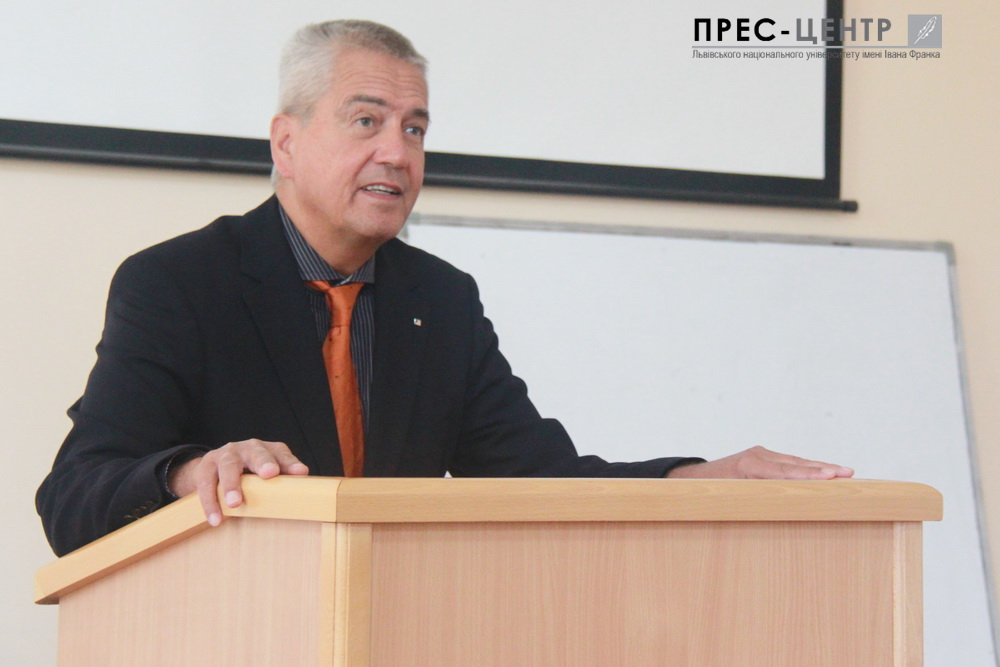
The factors of an enterprise success and realization of succession model in business are the main issues emphasized by the majoritarian joint owner and the Head of the Council of International Enterprise Group Storch-Ciret Group as well as the founder of the Foundation for Sustainable Entrepreneurship Horst Rogusch during the lecture for the students and lecturers of Ivan Franko National University of Lviv held on September 28, 2016.
“I am 68 years old; I have worked as a business manager of a big enterprise for 41 years. Today I am standing on the threshold of making an important decision – limitation of my functions and transition to the position of the member of the Supervisory Board. In Germany it is very important to understand the difference between the notion “a director” and “a member of Supervisory Board”. The latter, in fact, carries out a control function and gives advice” – Horst Rogusch noted.
The German entrepreneur believes that the solution of the succession problem in business is very complicated and hard work; hence, having experience in scientific work, he intends to help entrepreneurs to find a way to solve the solution of the succession problem in business. According to Horst Rogusch, a third of firms can’t cope with this problem; as a result, they disappear from the market soon.
The founder of the Foundation for Sustainable Entrepreneurship also outlined some aspects of the self-fulfillment of a personality in the context of doing business. In the entrepreneur’s opinion, the most important for a person is the ability to understand oneself and bring clarity to the relationships with others. “The important criterion of selecting applicants for our firm is a person’s ability to ask oneself and find the answer, set goals and achieve them. It is an important factor promoting the integrity of a personality. Simultaneously, it is also important that those goals won’t do harm to anybody” – Horst Rogusch believes.
The German businessman briefly told about the enterprise he owned and he noted that the financial turnover was 200 million euro per year. According to his words, it is the result of correct and timely strategic decisions made by the management.
“One of the most important goals of each enterprise must be a benefit for a client. Thereafter, it maximizes the profits and the number of workplaces. This goal can be achieved only when the problem of a potential customer is solved”, – the businessman assures.
As Horst Rogusch noted, the solution of a client’s problem calls for its analysis and definition and it shouldn’t depend on a certain product. Namely, an enterprise must help to choose the right thing for appropriate purposes without limiting a customer with one certain product.
Turning directly to the issue of the succession in business, the German businessman told about the establishment of two funds – the Charitable Foundation for Sustainable Entrepreneurship and Foundation of Common Property during his lecture.
“If the establishment of the first fund is my contribution to the development of Europe, the Fund of Common Property is established for economic success of my enterprise; it is where I have majoritarian part of my shares”, – the businessman noted.
Horst Rogusch noted that due to this strategy, the enterprise didn’t belong to anybody juridically except for the Fund of Common Property. Therefore, the Fund managers can sell their shares only to verified companies. In case if we can’t find a relevant candidate for the transfer of business, the part of shares is given to the Fund back as its goal is to take care of the persistence and prosperity of the firm.
“The business management can be transferred to three managers, one of them is a majoritarian shareholder. It is necessary to select candidates scrupulously and verify each detail – the person who takes business can’t be random. By the way, I spent 10 years for it.” – said Horst Rogusch.
The German entrepreneur explained: “Thus, I deprive my family of the right to inherit my business. But the development of my firm is more important for me than the financial position of my descendants.”